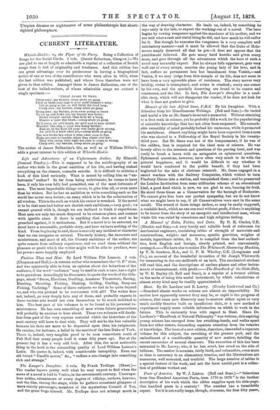and useful a life as Mr. Smee's deserved a memorial.
Without attaining to a first rank in science, yet he probably did a work for the popularising of scientific knowledge that has not often been surpassed. His remark- able versatility of mind probably forbad his eminence, while it promoted his usefulness. Almost anything might have been expected from a man who was elected to a Fellowship of the Royal Society in his twenty- third year. But Mr. Smee was not of the temperament, if he was of the calibre, that is required for the ideal man of science. He was keenly alive to the interests and questions of the passing hoar, and mks
ready to break a lance with an antagonist on ephemeral questiona. Ephemeral questions, however, have often very much to do with the general happiness, and it would be difficult to say whether it would have conduced to the public benefit, if they had been -neglected for the sake of abstruse researoh. Mr. Smee engaged in a smart warfare with the Railway Companies, which wished to turn Finsbury Circus into a station, and vanquished them ; and he preserved the London Institution from some utilitarian scheme of an educational kind, a good deed which is now, we are glad to see, bearing its fruit. He stood three times as a Conservative for the borough of Rochester. We cannot give him here our perfect sympathy, but we do not know what we might have to say, if all Conservatives were oast in the same mould. The record of these doings makes, as may be easily supposed, a readable book, which no one can read without profit, if there is anything to be learnt from the story of an energetic and intellectual man, whose whole life was ruled by conscience and high religious feeling.






























 Previous page
Previous page